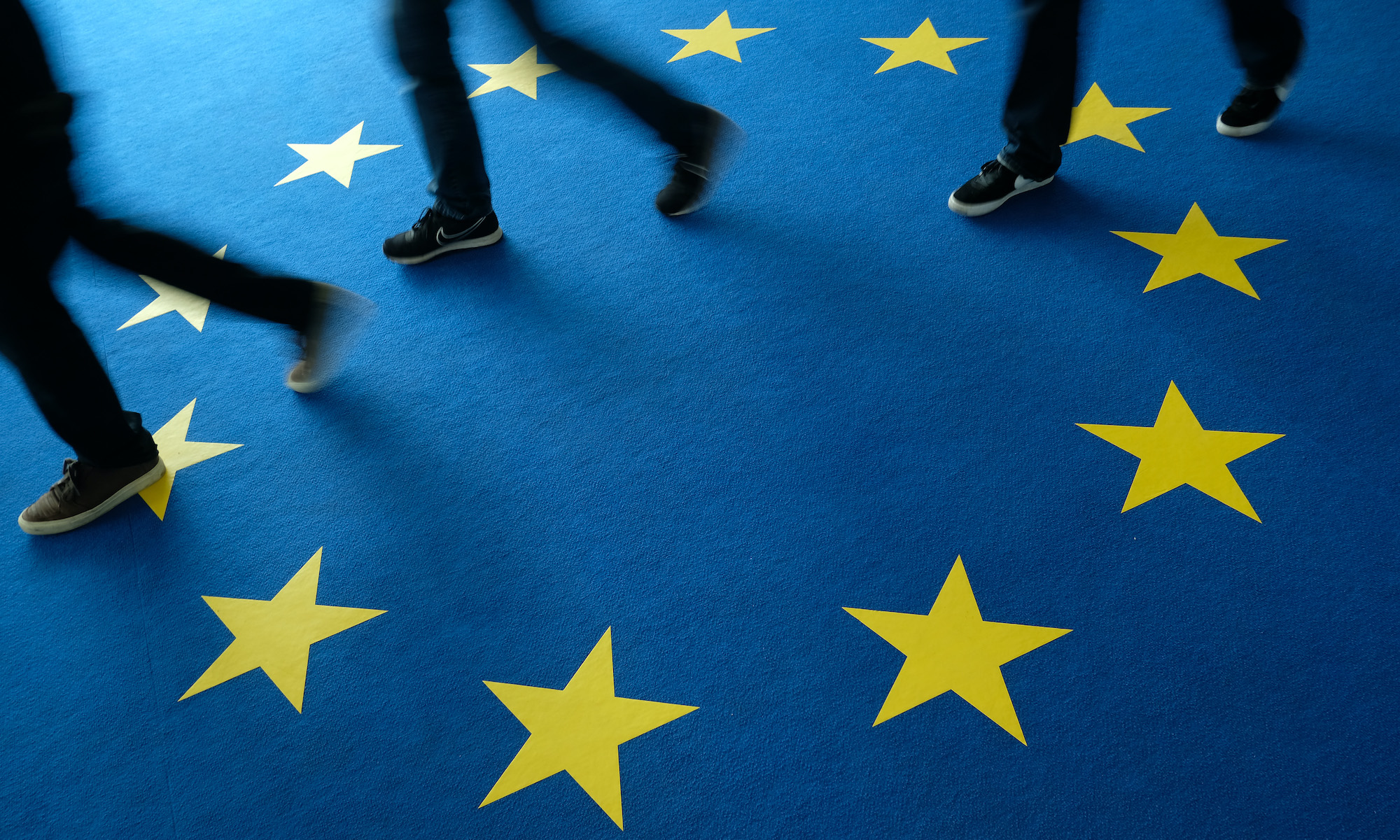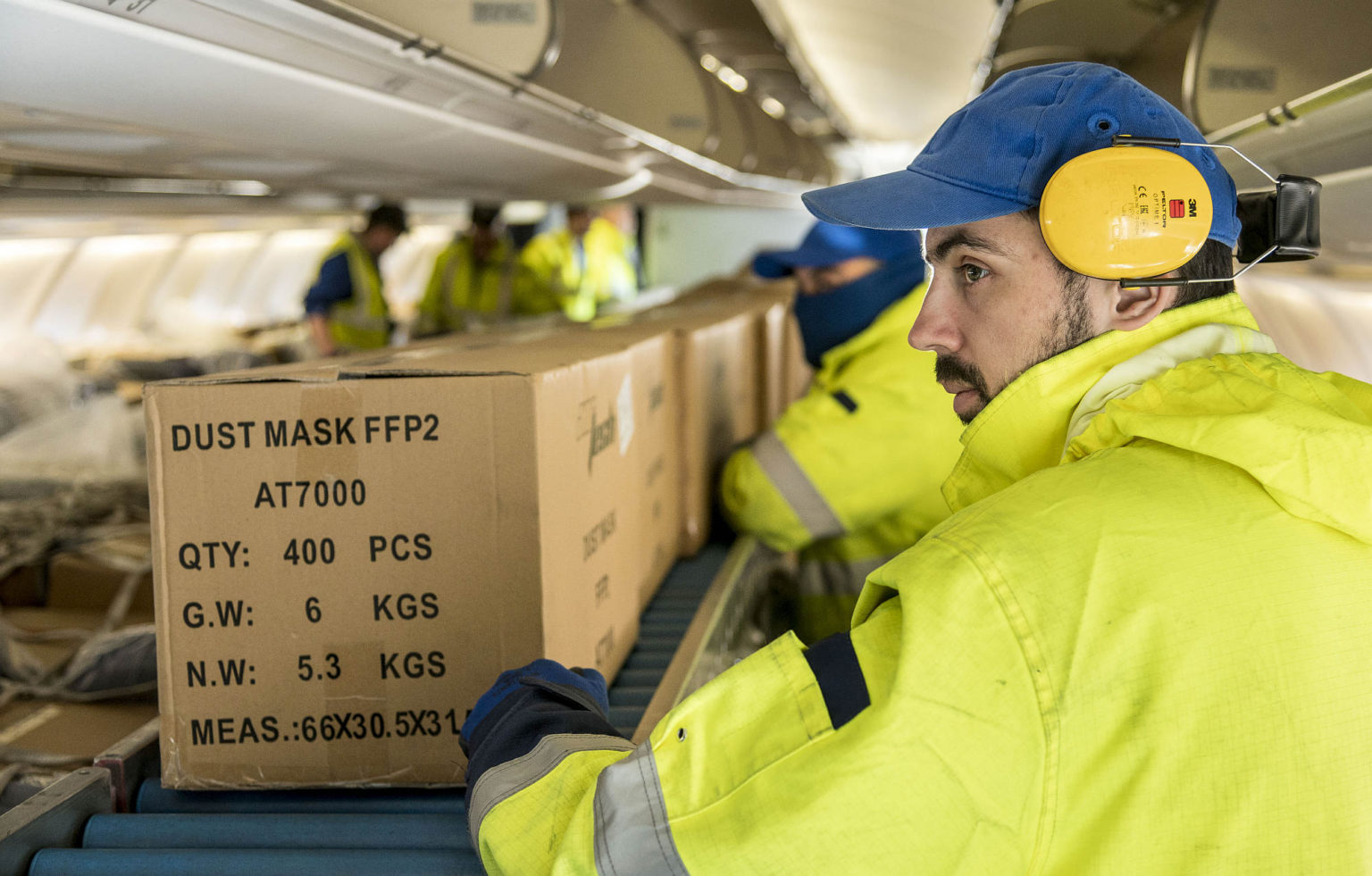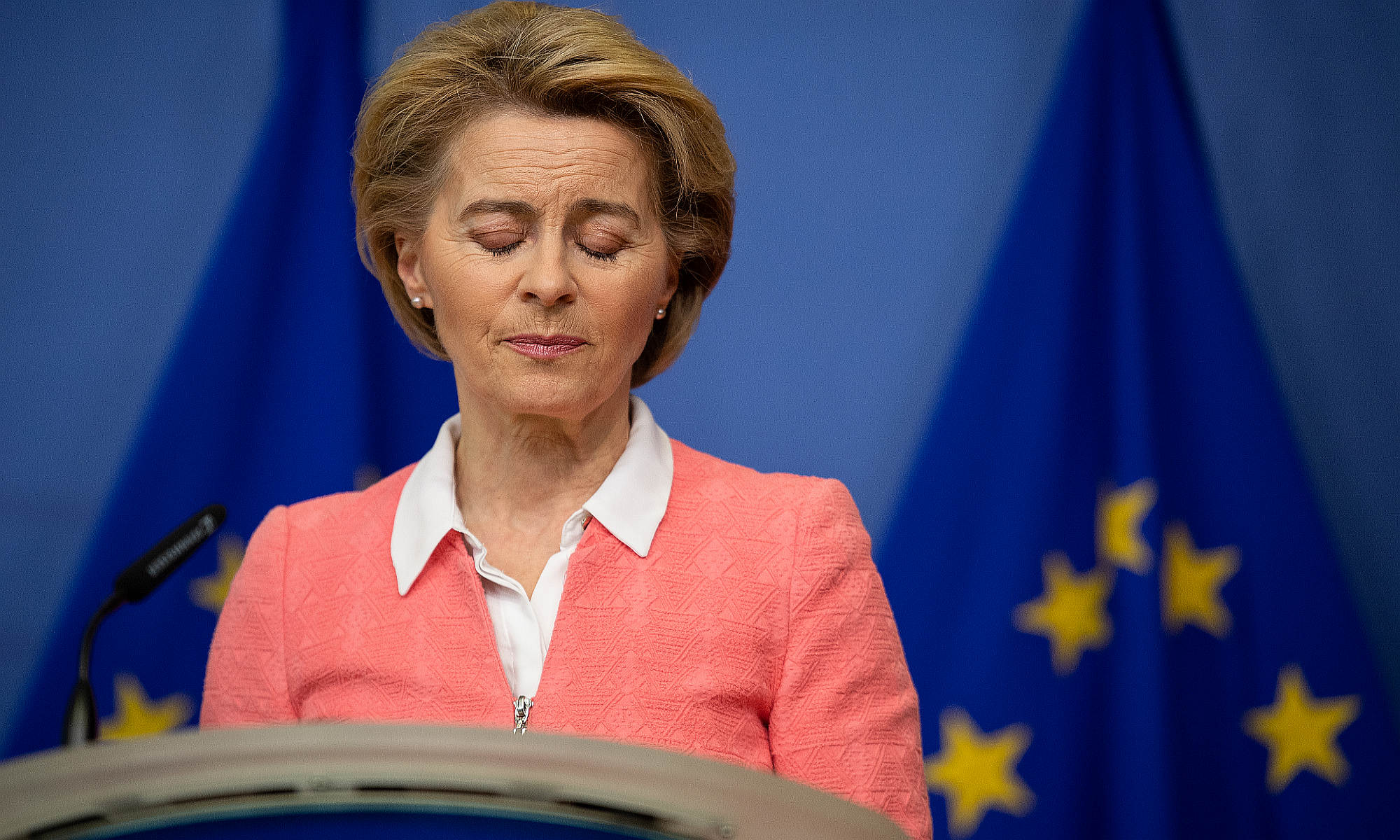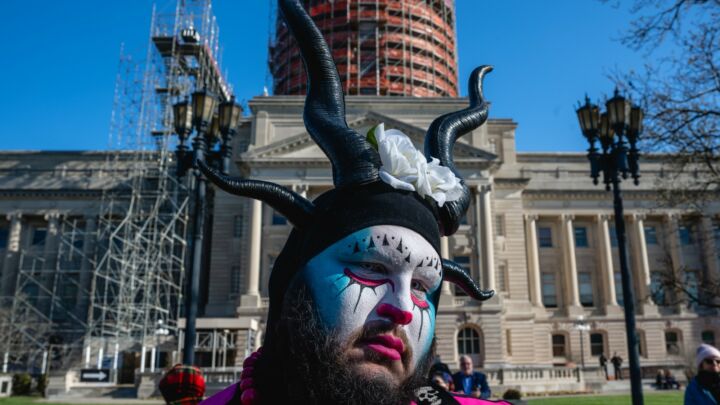
Long-read
The pandemic has utterly exposed the EU
When disaster struck, the EU was irrelevant at best, a hindrance at worst.
At the end of 2020, hope was on the horizon. The arrival of effective and safe vaccines would allow Europe to emerge from the wreckage of the coronavirus pandemic and rolling lockdown. The day before the start of the EU’s vaccine rollout, European Commission president Ursula von der Leyen hailed ‘vaccination day’ as a ‘moment of unity’ – the product of a ‘European success story’.
Several weeks later, and the picture is clearly very different. The EU has vaccinated just three per cent of its population, trailing behind its closest neighbour – Brexit Britain – which this week surpassed 15 per cent. Supplies of the vaccine have dwindled on the continent, forcing the rollout to pause in parts of Germany, Italy and Spain.
The EU’s attempts to deal with this have led to blazing diplomatic rows with the UK, Ireland, Japan and Canada over export controls. In their flailing, the French president and sources in the German government have been caught spreading untruths about some of the vaccines’ efficacy. The best German chancellor Angela Merkel could say of the situation was, ‘I believe that nothing has gone wrong’.
Even the most Europhile voices – from the Observer to The Economist – have acknowledged that something has gone badly wrong. But it would be a mistake to view the vaccines debacle as a one-off blunder. In truth, the EU has been found wanting at every stage of this crisis.
Italy alone
Given the international nature of the pandemic, the need for cross-border cooperation might seem obvious. It sounds exactly like the kind of problem that a ‘European Union’ might be well placed to tackle. But cooperation was elusive at first.
Italy was the first European country to be struck by the virus. On 31 January 2020, the government declared a state of emergency. In February, 11 municipalities in Lombardy and Veneto were put under lockdown. By March, the lockdown had been extended to the whole country.
The Italian government appealed to its neighbours for help, activating the EU’s mechanism of civil protection to ask for supplies of protective medical equipment. But no European country answered the call. In fact, a week before, Germany had imposed a ban on the export of PPE such as medical masks, gloves and goggles. The authorities impounded consignments intended for other countries which were either stored in or passing through Germany – even if they had already been bought and paid for. France also banned the export of medical masks under the less-than-convincing pretext that it was carrying out an inventory in preparation for ‘a concerted European vision’. Thankfully these bans were lifted within a few weeks, but this was a sign of things to come.

Even as early as February, it was clear that the Covid pandemic was not only a health crisis, but an economic crisis, too. Health has largely been a matter for member states (more on that later), but the EU and its institutions have played an increasingly dominant and destructive role in economic life in the past decades. Membership of the Euro has paralysed the Italian economy, which never truly recovered from the financial crash in 2008 and the subsequent Euro crisis. By February, the virus had disabled Italy’s most important production hubs – Veneto and Lombardy were the hardest hit regions, where the first lockdowns were imposed on European soil.
Despite this, the EU was complacent. Around this time, Christine Lagarde, the head of the European Central Bank (ECB), said the coronavirus was yet to cause a ‘long-lasting shock’ and did not require a policy response from the ECB. By March, the Italian stock market was in turmoil and the infamous ‘spread’ – the difference in borrowing costs between Italian and German government bonds – had widened, reviving bitter memories of the Eurozone debt crisis.
But Lagarde still appeared to be unmoved at first, telling journalists that the ECB was ‘not here to close spreads’. This triggered a panicked sell-off of Italian bonds. The worrying implication of her remarks was that the ECB would not step in to save Italy from collapse, which would have catastrophic consequences for both Italy and the global economy. Lagarde then had to apologise. A week later and the ECB announced an emergency bond-buying programme of €750 billion.
In mid-March, in the same week that Italy’s deaths from Covid overtook China’s, the European Court of Justice decided to punish Italy, by levying the virus-stricken government with a €7.5million fine (plus an additional €80,000 for each day it went unpaid). The fine was for ‘illegally’ subsidisng Sardinia’s struggling hotel industry. As has been pointed out frequently on spiked, the EU’s state-aid rules have taken on a life of their own – divorced from any sound economic principle, as if their very purpose is to demonstrate the EU’s right to meddle in economic affairs.
Just days after the fine on Italy, as the rest of Europe fell into lockdown, the EU suspended its state-aid straightjacket to allow member states to give cash to businesses to keep their economies afloat. For once, Brussels recognised that the best way to serve Europeans was to get out of the way.
European disunity
By the end of March, nearly every country in Europe was in lockdown. The EU’s borderless and passportless Schengen Area celebrated its 25th anniversary at a time when 14 member states had reimposed national borders to keep out the virus. The Single Market had effectively been suspended, too. Export bans and closed borders disrupted supply chains, with some trucks facing delays of 14 to 18 hours coming in and out of Poland, while France called on its supermarkets to embrace ‘economic patriotism’ by only stocking French food.
National governments were spending vast amounts to bail out companies they had forced into hibernation, and to prop up the incomes of the workers they had decommissioned. All this state spending was unaffordable for the poorer member states, who needed EU help. The European Stability Mechanism (ESM) was set up during the Eurozone crisis to offer loans to countries in need. The ESM tried to offer €270 billion worth of loans, but no country took this up, fearing that onerous conditions, such as austerity measures, would be attached to any bailout.
Instead, nine EU countries, including France, Italy and Spain, called for the creation of ‘coronabonds’ – a one-off, common European debt instrument. But this was strongly opposed by Germany and the so-called ‘Frugal Four’ (Austria, Denmark, the Netherlands and Sweden). The months of wrangling over the economic-rescue package revived the bitter tensions that had emerged during the Eurozone debt crisis between Europe’s frugal north and struggling south.
In the end, a deal was reached in July for a €750 billion recovery fund, attached to the upcoming seven-year EU budget. One novelty was that the money for the fund will be raised by Brussels through borrowing (rather than through taxes collected by member states). This innovation led excitable Europhiles to announce that the EU’s ‘Hamiltonian moment’ had arrived – supposedly echoing the Compromise of 1790 when the US federal government assumed all the debt incurred by the states during the War of Independence.

Whatever its political significance for the EU and ‘ever closer union’, in purely economic terms the recovery fund is a flop. Comparing it to the America of the present rather than the 18th century puts it in a much less flattering light. The United States is planning a gargantuan economic stimulus package, which is worth 25 per cent of GDP. The EU’s recovery fund, in contrast, will be worth just one per cent of GDP. The US is throwing the kitchen sink at its economy; the EU is throwing in the towel. Amid the backslapping and self-congratulation, for ordinary Europeans another wave of austerity beckons.
Bizarrely, even as compromises were found between the budget net-givers and net-receivers – though whether these compromises will be tolerated by voters in member states has yet to be tested – the recovery fund became an opportunity for the EU to interfere with member states on a different front. Hungary and Poland initially vetoed the budget over proposed conditions related to the ‘rule of law’. What the EU really objects to is not so much the law per se, but Eastern Europe’s growing conservatism over culture-war issues, from trans rights to migrant quotas. And so the EU’s great moment of unity has actually revealed significant tensions, not only between north and south but now between west and east, too.
Vials and tribulations
The EU is not normally responsible for health matters, but when it came to the vaccines, member states were won over by the usual pro-EU arguments: a coordinated approach would foster unity over ‘vaccine nationalism’, and thanks to the EU’s size, it could cut better, more robust deals with manufacturers. More importantly – as is perhaps the true raison d’être of the EU – national governments would be allowed to wash their hands of responsibility for developing and executing a strategy.
But the lack of health experience came at a cost. As The Economist points out: ‘The job of overseeing a project costing €2.7 billion to vaccinate 450million people was handed to a department whose main previous concern was food labelling.’
The EU made a key error in strategy: it prioritised getting the lowest price and avoiding liability. When the deals were wrapped up, the EU could proudly boast that it had saved millions of euros. But this was a false economy. The delays caused by the extra negotiations would come at a cost – of billions of euros in lost economic output as the continent remains in lockdown, and of course of the many lives lost to the coronavirus.
It wasn’t simply that the EU made mistakes. Its very presence was holding up the delivery of vaccines. The UK secured a deal for the Oxford / AstraZeneca vaccines in May 2020, three months before the EU did, which allowed for an additional three months to sort out kinks in the supply chain. In June, AstraZeneca reached preliminary agreements with the Inclusive Vaccine Alliance – made up of Germany, the Netherlands, France and Italy. But then, the European Commission took over the negotiations on behalf of the whole of the EU, adding an extra two months of talks which resulted in ‘no material changes’ to the deal. But the lost two months meant that by the time the vaccine rollout had started, production problems meant that AstraZeneca could only produce half the doses it had offered. Had the Inclusive Vaccine Alliance stuck to its strategy, production problems could have been solved earlier and the rollout would be speeding ahead.
The approval process has been slower, too. For a vaccine to gain EMA approval, it has to be authorised by the regulators in 27 member states. The US, UK and Canada also granted emergency approval to the Pfizer / BioNTech vaccine, which the EU has declined to do, despite the obvious state of emergency. The EMA did shorten its approval process from around 210 days to fewer than 150, but it has still been much slower to approve vaccines than elsewhere. Despite loud protestations from European leaders, like Ursula von der Leyen and Emmanuel Macron, that a faster approval process would be unsafe, the EMA has not diverged from any of the decisions made by the UK’s regulator – it has just made them more slowly.
Jean Monnet, one of the EU’s founding fathers, used to say that ‘Europe will be forged in crisis’. Instead, the crisis has exposed the EU’s systemic failings. At the beginning of the pandemic, the EU was blissfully irrelevant. Now it is the main barrier to bringing the crisis to an end. Europeans deserve so much better.
Fraser Myers is assistant editor at spiked and host of the spiked podcast. Follow him on Twitter: @FraserMyers.
Pictures by: Getty.
To enquire about republishing spiked’s content, a right to reply or to request a correction, please contact the managing editor, Viv Regan.








Comments
Want to join the conversation?
Only spiked supporters and patrons, who donate regularly to us, can comment on our articles.